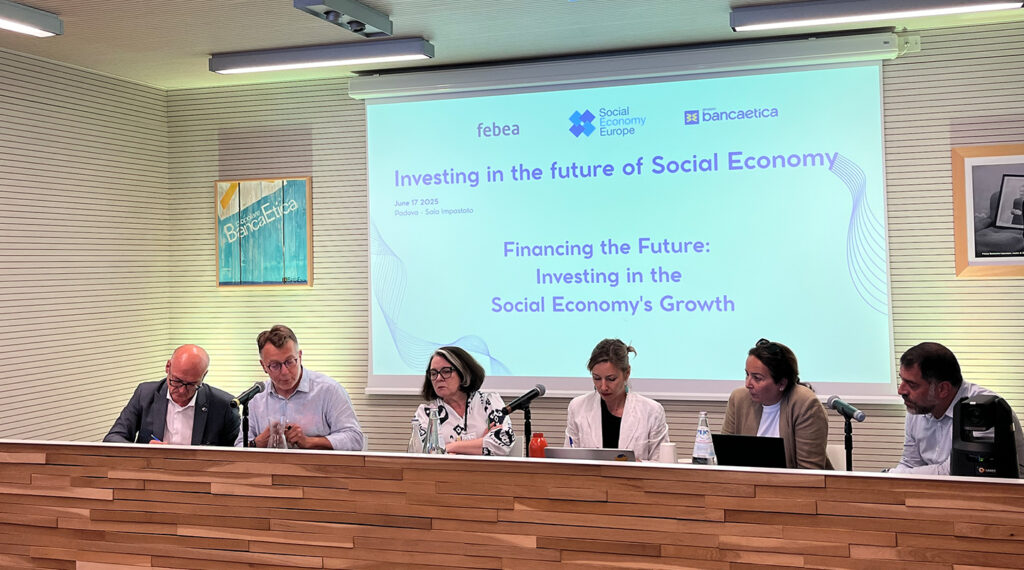Foundations as Social Economy strategic actors in a continent in transition

Europe is facing a new era defined by deep uncertainty and rapid transformation. Social and climate disruption, geopolitical instability, rising inequalities, democratic backsliding, and the exponential growth of digital technologies are converging into what many now call a polycrisis. These overlapping challenges do not only demand immediate responses — they require long-term, anticipatory thinking and bold structural changes. In this context, foundations as social economy actors are being called to evolve beyond their traditional roles as grantmakers or safety nets. They must become strategic actors, helping to shape the future of the continent.
For decades, European foundations have played a crucial role in addressing social, cultural and environmental needs. The scale and complexity of today’s crises call for a move forward.
This transformation is already underway. A growing number of foundations are embracing transformational philanthropy – a model that combines grantmaking and impact investing, operating and long-term vision and deep partnerships with civil society, governments and the private sector. They are investing in collective impact platforms, co-creating agendas with affected communities, and testing innovative financial tools such as mission-related investments or blended finance.
Moreover, the European philanthropic sector is increasingly aware of its responsibility not just to fund change, but to model it. That means rethinking governance structures, embracing transparency and accountability and actively working to include underrepresented voices in decision-making processes. It also requires adopting a forward-looking mindset – one that integrates strategic foresight, anticipatory governance and scenario planning as core capacities.
As Europe transitions, foundations must position themselves not at the margins of change, but at its core. Their unique ability to act with independence, flexibility and purpose makes us indispensable allies in navigating this historic moment of transition.
I had the honour of representing Philea at the annual assembly of Social Economy Europe, hosted under the logo of “Investing in Social Economy” in Padua by Banca Etica. One of the main takeaways from the discussions was clear: Foundations are key social economy actors for the future of Europe. The mid-term review of the Social Economy Action Plan, the debates on the EU’s post-2027 budget and initiatives like InvestEU are all openings to hard-wire the contributions of foundations into Europe’s strategy for an inclusive, sustainable future.
Social economy organisations span cooperatives, mutuals, associations, foundations and more – entities that put social and environmental goals first and reinvest profits for good. One of the conclusions of the Assembly was the importance of adding to multiply our impact. Within this diverse ecosystem, foundations carry an outsized financial weight on the supply side of social investment: 175,000 public-benefit foundations collectively expend roughly €76 billion annually and hold over €500 billion in assets. These resources position foundations as major economic players in the social economy, far beyond what their sheer numbers might suggest.
Foundations are not only grantmakers; they are also institutional investors and partners, managing structural budgets and acting as financial intermediaries in pursuit of their missions. Across Europe, philanthropic organisations engage in a wide spectrum of activities: from traditional re-granting to grassroots initiatives, all the way to venture philanthropy, impact investing and social finance. In practice, many large foundations invest their endowments in projects that align with social goals (so-called mission-related investments), provide loans or equity to social enterprises and even serve as co-financiers in blended funds.
Crucially, foundations also help generate quality demand in the social economy by identifying unmet societal needs and funding innovative solutions, they create opportunities for social enterprises, cooperatives and others to flourish; and they implement innovative solutions and positive impact projects coworking with the people they work for. This transversal role cuts across sectors and issues, making foundations key to developing the welfare society and collaborating with the public administrations in areas of general interest”. In other words, foundations work hand-in-hand with public authorities, private actors and the social sector, reaching parts of society that other models may not, a role that is distinctly systemic compared to others.
In this regard, as the Social Economy Action Plan (SEAP) undergoes its mid-term review this year, we have a timely opportunity to ensure that the contribution of foundations is fully recognised and reinforced in European policy. One key area needing reform is the patchwork of national laws that can restrict foundations from engaging in impact investing or partnering in public-private financial instruments. In some EU countries, outdated regulations or tax rules effectively discourage foundations from providing loans, equity or guarantees by treating such activities as overly risky or outside charitable purpose. This is slowly changing: for instance, the Netherlands recently adopted a standardised tax ruling to allow all foundations to participate in impact investing, replacing the old case-by-case approval process. Such breakthroughs demonstrate that legal barriers to philanthropic investment can be overcome and they provide a blueprint for EU-wide standards to unlock foundation capital.
Indeed, the European Commission itself has highlighted the need to address these hurdles. The SEAP includes measures to reduce barriers to cross-border philanthropy, improve tax treatment and foster co-investment facilities that blend public and private funds for social impact. Now, these ideas must be pushed further. National governments should update foundation laws to explicitly permit mission-related investments and participation in impact funds or guarantees, while the EU can support by promoting best practices and potentially a common framework. Removing such obstacles will empower foundations to put more of their assets to work for society – alongside public investors – without jeopardising their public-benefit mandates.
On the European stage, foundations also deserve a seat at the table of major investment initiatives. Programmes like InvestEU, the EU’s flagship investment vehicle, are set to play a decisive role in financing social and green transitions. Yet until recently, discussions around these instruments often focused on banks, venture capital and SMEs, with scant mention of foundations. This must change. Foundations and mutuals bring not only capital but also deep expertise in social issues and they can help target funds where they are most needed and take risks that pure market actors avoid. Encouragingly, the InvestEU framework has started to open up: its social investment and skills window, along with advisory services, are accessible to impact investors including foundations. The European Investment Bank (EIB) and European Investment Fund (EIF) have already begun working with philanthropic organisations through co-investment and risk-sharing tools to catalyse more funding for social enterprises.
To build on this, the next EU Multiannual Financial Framework (MFF) for post-2027. The European Commission is expected to share its proposal on 16 July, and we are extremely concerned that the EU’s cohesion funds and ESF+ could be jeopardised. The main financial instrument for supporting the most vulnerable regions and people, employment, education, training and social inclusion. We need to safeguard the EU system based on ensuring cohesion and social matters, enshrined in the EU Treaty as an essential part of our system and which cannot be put up for debate or at risk and where foundations and social economy are key players.
Besides, European philanthropy networks have called for a dedicated co-investment facility under InvestEU to leverage foundation endowments alongside EU budget guarantees. Saving Implementing this would be transformative because it could crowd in hundreds of millions of euros from foundations for public-good projects, while offering them a prudent way to scale impact. In short, Europe’s long-term funding strategies should treat foundations as strategic allies in investment for social outcomes, not as an afterthought.
Europe offers concrete examples of how foundations can act as effective investors. In 2018, Fundación ONCE’s social business group – through which the ONCE Foundation channels its mission related to investment- secured a €35 million loan from the EIB (the first of its kind for a social economy enterprise in Spain) backed by the EU’s Juncker Plan. The funds supported inclusive employment, accessible infrastructure and assistive technologies. The initiative became a model for future EU support. In 2024, ILUNION replicated this with a €60 million green loan, partially backed by InvestEU, to enhance energy efficiency and disability employment. These cases show how philanthropic and EU capital can successfully combine to scale social impact.
Globally, the social economy is gaining ground as a concept for inclusive and sustainable development. In April 2023, the United Nations General Assembly adopted its first ever resolution on the Social and Solidarity Economy, officially defining the SSE and affirming its importance for achieving the Sustainable Development Goals. The OECD has likewise elevated this agenda: in 2022 the OECD Council agreed on a Recommendation to advance the social economy and social innovation, underlining the sector’s potential to pioneer new business models and deliver social value at scales. And in our interconnected world, cross-border collaboration is on the rise. Our message is clear: when foundations, social economy, governments and private investors collaborate and co-invest, we unlock solutions at a scale that matches the challenges of our time, leaving no one behind.
Authors

